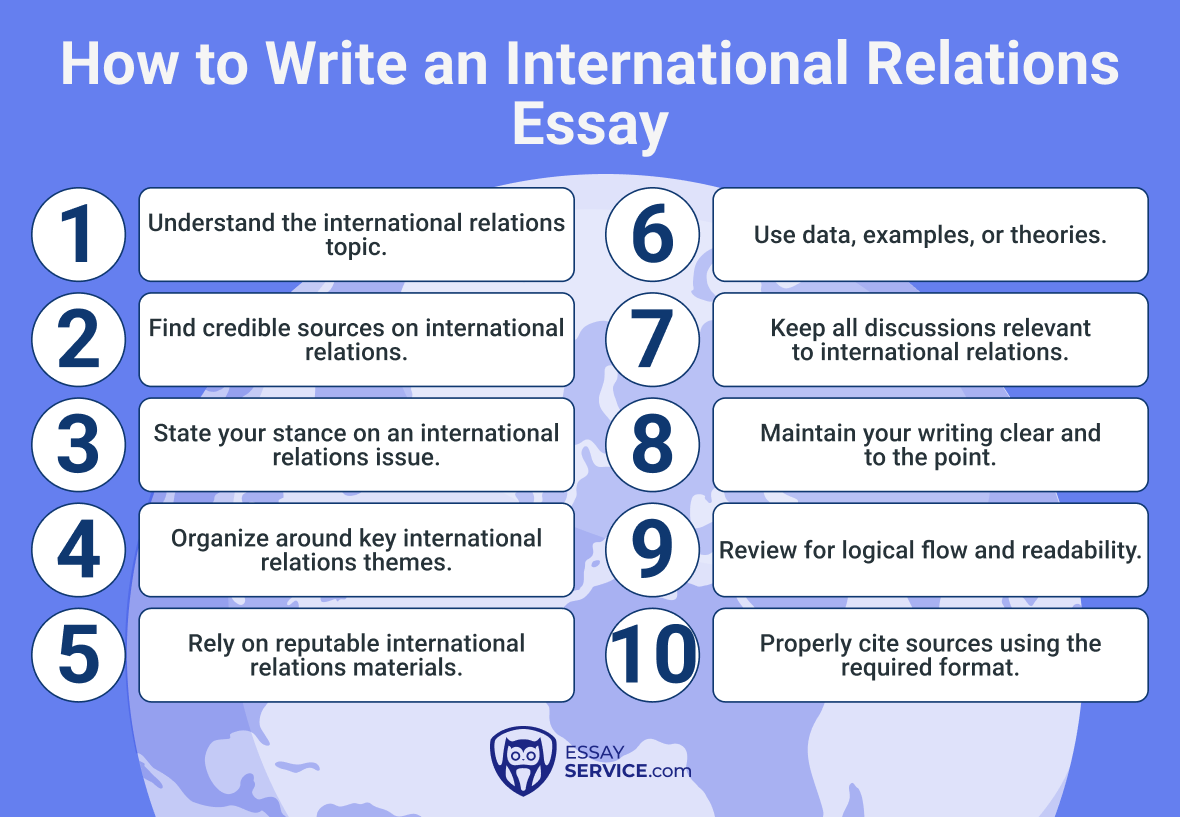
International Relations Essay: Definition, Outline, and a Step-by-Step Writing Guide
When it comes to writing an essay on international relations theories or a similar topic, it's all about striking the right balance between depth and clarity. In this article, we'll dive into the key steps of how to write an international relations essay on global issues. From doing thorough research to presenting your arguments effectively, we'll walk you through the process step by step. In case you need a rapid hands-on solution to an ongoing problem with a particular assignment, we can write essay for money tailored to all your needs.
What Is International Relations Essay?
International relations essays are scholarly compositions that explore and analyze various aspects of interactions between countries and the broader global community. These essays delve into diplomacy, conflict resolution, international organizations, global governance, and geopolitical dynamics. They often require rigorous research, critical analysis, and the synthesis of multiple perspectives to offer insights into complex global issues. This essay international relations students write pretty often aims to deepen their understanding of global affairs, shed light on key challenges, and propose potential solutions or interpretations of events.
How to Write an International Relations Essay?
Writing an international relations essay fosters understanding and dialogue about global issues. By examining complex international dynamics, these essays help individuals comprehend the interconnectedness of nations and the factors shaping international affairs. They provide platforms for discussing pressing global challenges such as conflict, climate change, human rights, and economic inequality, encouraging critical thinking and informed debate. Moreover, the importance of international relations essay is contributing to the development of diplomatic skills and promoting cross-cultural understanding, essential in a world increasingly defined by interdependence and diversity. Use these international relations essay tips to take your writing prowess to the next level.

Carefully Study the Essay Prompt
Before diving into writing, it's crucial to grasp the essay prompt thoroughly. Take time to dissect and interpret the international politics essay prompt, identifying its central themes, questions, or directives. Look for any specific instructions regarding the essay's scope, focus, or structure. Highlight key terms or concepts that will guide your analysis and argumentation. Understanding the prompt sets the foundation for a focused and relevant essay, ensuring that your writing addresses your instructor's or academic institution's core requirements and objectives.
Carry Out Research
Once you understand what’s required to do in an essay on international relations, undertake comprehensive research to gather relevant information and insights. Utilize various credible sources, including academic journals, books, government publications, and reputable websites. Take thorough notes, organizing your research materials systematically to facilitate later analysis and synthesis. Be discerning in evaluating sources, prioritizing those that offer rigorous analysis and empirical evidence. Effective research provides the foundation for constructing well-informed arguments and developing a nuanced understanding of the topic.
Cogitate a Thesis Statement
With a solid grasp of the prompt and research findings, craft a clear and concise international relation essay thesis statement. This statement should encapsulate the main argument or perspective that your essay will explore. It serves as the guiding principle for your writing, providing direction and focus for your analysis. A strong thesis statement is specific, debatable, and relevant to the topic, offering a compelling stance or interpretation that you will substantiate throughout the essay. Take time to refine your thesis statement, ensuring that it effectively captures the essence of your argument and sets the stage for a coherent and persuasive essay. ‘What if I write my essay online?’ That would be wise if your energy levels are depleted and you need a good night’s sleep.
Outline the Essay Structure
Once you have a clear thesis, outline the structure of your essay. Divide it into an introduction, body paragraphs, and conclusion. In the introduction, provide context for your topic, introduce your thesis, and outline the main points you will discuss. Each body paragraph should focus on a single aspect or argument supported by evidence and analysis. Transition smoothly between paragraphs to maintain coherence. Finally, in the conclusion, summarize your main points, restate your thesis, and offer insights or suggestions for further research. A well-organized structure enhances readability and helps convey your ideas effectively.
Write and Revise
With your outline in hand, begin drafting your essay on politics. Write concise sentences and paragraphs, ensuring coherence and logical flow between ideas. Support your arguments with evidence and analysis, citing sources properly. After completing the first draft, take time to revise and refine your work. Check for clarity, coherence, and consistency of argumentation. Edit for grammar, punctuation, and style errors. Consider feedback from peers or instructors to strengthen your essay further. Revision is crucial in polishing your essay and ensuring it meets academic standards. You can hire an essay writer to polish your draft in and out.
Cite Sources and Format the Text
Properly cite all sources used in your essay to avoid plagiarism and give credit to the original authors. Follow the citation style specified by your instructors or academic institution, such as APA, MLA, or Chicago. Double-check the accuracy of citations and bibliography entries. Pay attention to formatting details such as font size, spacing, and margins, adhering to academic guidelines. Consistent and accurate citation and formatting enhance the professionalism and credibility of your essay.

International Relations Essay Structure
The international relations essay outline typically includes an introduction, body paragraphs, and a conclusion. The introduction sets the stage by providing context for the topic, presenting a clear thesis statement that outlines the main argument or perspective of the essay, and previewing the key points to be discussed. The body paragraphs delve into specific aspects of the topic, each focusing on a single argument or idea supported by evidence and analysis. Transition smoothly between paragraphs to maintain coherence and logical flow. Use evidence from credible sources to substantiate your claims and provide depth to your analysis. Finally, the conclusion summarizes the main points discussed, restates the thesis, and offers insights or suggestions for further research or consideration, leaving the reader with a lasting impression of the topic's significance. Aim for the optimal international relations essay length of 1500-3000 words.
International Relations Essay Introduction
The introduction is the gateway to your essay, setting the stage for what follows. Here, you provide context for your topic, engage the reader's interest, and present your thesis statement. Start with a compelling hook to grab the reader's attention, such as a relevant quote, statistic, or anecdote. Then, gradually transition to the broader topic, providing background information and explaining its significance in international relations. Finally, conclude the introduction with a concise thesis statement outlining your essay's main argument or perspective. This statement should be debatable, specific, and relevant to the topic, offering a roadmap for what the reader can expect to encounter in the subsequent sections of the essay. If you need instant academic relief, shop for essays for sale on our website.
Main Body
The main body of your international relations essay is where you present and develop your arguments in detail. Each international relations essay paragraph of the main body should focus on a single aspect or argument related to your thesis statement. Begin each paragraph with a topic sentence introducing the main idea, followed by supporting evidence, analysis, and examples to substantiate your argument. Use a logical structure to organize your paragraphs, transitioning smoothly between ideas to maintain coherence and flow. Ensure that credible sources support your arguments and that you critically engage with different perspectives on the topic. Additionally, consider using subheadings to help organize your ideas and guide the reader through complex essay sections.
Conclusion of International Relations Essay
Think of an international relations essay conclusion as your opportunity to leave a lasting impression on the reader and reinforce the significance of your arguments. Begin by summarizing the main points discussed in the essay, highlighting the key findings and insights that have emerged. Then, restate your thesis statement, emphasizing how your analysis has contributed to a deeper understanding of the topic. Finally, offer some reflections or suggestions for further research, demonstrating the broader implications of your findings and leaving the reader with something to ponder. Avoid introducing new information or arguments in the conclusion; instead, focus on providing a concise and compelling synthesis of your essay's main ideas. Sounds like mission impossible? Then pay for paper and consider the assignment as good as ready!
International Relations Essay Topics
Below, you will find a diverse range of compelling topics in the field of international relations designed to inspire critical thinking and thoughtful analysis. From examining diplomatic relations between nations to exploring pressing global challenges, these international relations topics for essay provide fertile ground for insightful and engaging essays.
- Diplomatic negotiations and global peace.
- Climate change and international cooperation.
- Economic globalization's impact on developing nations.
- Humanitarian interventions in conflict zones.
- Cybersecurity threats in the digital age.
- Refugee crises and international response.
- Nuclear proliferation and disarmament efforts.
- Regional integration and its challenges.
- Terrorism and counterterrorism strategies.
- Gender inequality in international development.
- Environmental degradation and transboundary pollution.
- The role of international organizations in crisis management.
- Sovereignty disputes in the South China Sea.
- Ethnic conflict and reconciliation processes.
- Migration policies and human rights.
- The impact of social media on global politics.
- Energy security and resource competition.
- Human trafficking and international law enforcement.
- Cultural diplomacy and soft power projection.
- Health diplomacy and pandemic preparedness.
- Arms trade regulations and arms control agreements.
- International trade disputes and tariffs.
- Religious extremism and interfaith dialogue.
- Space exploration and international collaboration.
- Water scarcity and interstate conflicts.
- Maritime piracy and maritime security measures.
- Diaspora communities and their role in international relations.
- Indigenous rights and self-determination movements.
- Climate refugees and displacement challenges.
- Economic sanctions and their effectiveness in achieving policy goals.
Another interesting and simple topic is why I want to study international relations essay. It allows students to articulate their motivations, aspirations, and personal connections to the field. This topic encourages self-reflection and provides insight into the individual's interests and potential contributions to the study and practice of international relations.
International Relations Essay Examples
Examples of international relations essays can be incredibly beneficial for students as they provide practical illustrations of effective argumentation, research techniques, and writing styles within the discipline. By studying these examples, students can learn how to structure their essays, develop coherent arguments, and effectively incorporate scholarly sources to support their points. Additionally, analyzing diverse examples exposes students to manifold topics and perspectives, enriching their understanding of international relations issues and approaches.
Summary
Working on an interpersonal relationship essay allows students to explore human connections, communication, and interaction dynamics. These essays provide an opportunity to delve into the complexities of relationships within various contexts, including personal, familial, romantic, professional, and societal. By examining factors such as trust, empathy, conflict resolution, and social influence, students gain insights into the intricacies of building and maintaining meaningful connections with others. Moreover, interpersonal relationship essays often encourage reflection on one's experiences, attitudes, and behaviors, fostering self-awareness and emotional intelligence. throughout their lives. To hone your skills, you can also consider reading the guide on what is gender equality essay and how to write it well.
Frequently asked questions
What Are Some Good International Relations Essay Questions?
Good essay questions in international relations should provoke critical thinking and analysis of contemporary global issues. For example, questions could explore the impact of globalization on state sovereignty, the role of non-state actors in international politics, or the effectiveness of international institutions in addressing transnational challenges. Additionally, questions focusing on specific regions or conflicts, such as the Middle East, East Asia, or cybersecurity threats, provide in-depth examination and debate opportunities.
How to Explain the Constructivism International Relations Essay?
Constructivism in international relations posits that identities, interests, and norms are socially constructed, shaping state behavior and interactions in the international system. In an essay on constructivism, one would explain how this theoretical perspective diverges from traditional realist and liberal approaches. Emphasizing the importance of ideas, beliefs, and historical context, the essay would illustrate how constructivism offers insights into issues such as state identity formation, the spread of international norms, and processes of institutional change.
What Are the Implications of Positivism for the Study of International Relations Essay?
Positivism, emphasizing empirical observation, quantifiable data, and causal relationships, has significant implications for studying international relations. In an essay exploring these implications, one might discuss how positivist methodologies, such as statistical analysis and case studies, contribute to understanding international conflicts, cooperation, and decision-making processes. Additionally, the essay could examine critiques of positivism, including its limitations in capturing the complexities of human behavior and power dynamics in global politics.
New posts to your inbox!
Your submission has been received!




